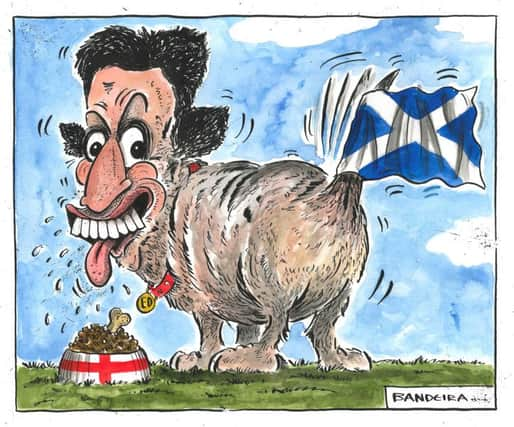Tom Richmond: Dangers of a Scottish tail wagging the English dog


Judging by the current state of the opinion polls, and possible permeations in the near-certainty of a hung parliament, brace yourselves because such an illogical scenario could actually come into play.
My reason is this. There’s every chance that the Tories will accrue the most votes, and MPs, on May 7 but that David Cameron will struggle to form a coalition because his party will lose a critical number of seats due to Nigel Farage’s Ukip splitting the right-wing vote and Nick Clegg’s Lib Dems becoming a much-depleted force.
Advertisement
Hide AdAdvertisement
Hide AdYet, even with Mr Miliband’s party suffering big losses in Scotland, the Doncaster North MP is likely to be far better placed to muster the 325 MPs needed to pass a Queen’s Speech and a Budget because the Lib Dems, Scottish Nationalists and Plaid Cymru will not want to force a second election within a matter of weeks. Such a scenario will trigger a constitutional crisis and potentially leave the United Kingdom at breaking point – the stakes will be that high now that David Cameron has made English nationalism a key issue.
Yet, in an irony of political history, this is precisely how the very first Labour-led government came about in January 1924 following the deeply inconclusive election of the previous month which left Stanley Baldwin, the Tory prime minister, with 258 seats after accruing 5.3 million votes. After weeks of procrastination, and a vociferous campaign by the right-wing press who vehemently opposed the prospect of socialist “wild men” taking command of Britain, Ramsay MacDonald formed a minority government despite winning 191 of the 615 seats up for election. The number of votes cast in Labour’s favour was about one million fewer than those in favour of the Conservatives.
Of course politics 90 years ago was very different – the Liberals and their Morley-born leader Herbert Asquith held the balance of power with 158 MPs at a time when Britain was plagued by recession – to the plurality of today and the full-on furore if the interests of England, the largest country in the United Kingdom, are marginalised by Nicola Sturgeon’s Scottish National Party being able to hold Mr Miliband to ransom over public spending and the renewal of the Trident nuclear deterrent to give two examples. However, while the Tories will spend the final 10 days of this desperate campaign prophesying about the dangers of the Scottish tail being allowed to wag the proverbial English dog, two other factors are likely to come into play.
First, the Conservatives will rue the unfairness of the first-past-the-post electoral system – even though this is the means by which Mr Cameron was able to become PM with just one MP in Scotland.
Advertisement
Hide AdAdvertisement
Hide AdThey will blame the Lib Dems for vetoing plans to redraw the Parliament boundaries and reduce the number of MPs by 50 in order to nullify Labour’s in-built advantage because of the greater concentration of constituencies in urban areas where voters are more likely to support Mr Miliband’s party.
Such a response will overlook three factors – Conservative complacency is the reason why they lost seats like Sheffield Hallam and Leeds North East in the 1990s; it was Mr Cameron who ordered the Tories to oppose the 2011 referendum on electoral reform and it was the Tories who propped up a minority SNP administration at Holyrood.
Will they now revisit their hostility to proportional representation, given the likelihood that the Commons majorities enjoyed by Margaret Thatcher and Tony Blair are unlikely to be replicated because of the electorate’s fragmented nature?
The second issue is the role of the 54 Yorkshire MPs who will be returned to the new Parliament. Unlike Harold Wilson or Herbert Asquith who were born in God’s own county and represented other parts of the country, Mr Miliband is a token Tyke with little affinity to Yorkshire other than his Doncaster North constituency.
Advertisement
Hide AdAdvertisement
Hide AdAs such, Yorkshire’s MPs should be expected to work together, and across party divides, to neuter the influence of the Nationalists from Scotland, Northern Ireland and Wales who will attempt to ride roughshod over the specific economic and infrastructure needs of this county.
Perhaps they should make this pledge: “Polls suggest there will be a hung Parliament after the election in which the SNP could attempt to dictate terms to the next government. If I become a Yorkshire MP in such a Parliament, I promise to vote against any decisions that leave this county at an unfair advantage.”
Unlike the SNP, which has been well-marshalled under Nicola Sturgeon and Alex Salmond, Yorkshire’s MPs have not pulled together for the advancement of this region – the last Labour government, including big hitters like Mr Miliband and Ed Balls, allowed the North to become wedded to the benevolence of the welfare state while top Tories like William Hague ignored the area’s policy challenges for too long. Much will depend on the final outcome – particularly if it is easier for Mr Miliband to form a government in spite of having fewer MPs than the Conservatives. Public and political reaction may rule out such a possibility and thereby force a second election. But this should not stop this county’s MPs from ensuring that the Yorkshire tail wags the Scottish dog at the very least. It would be a start.